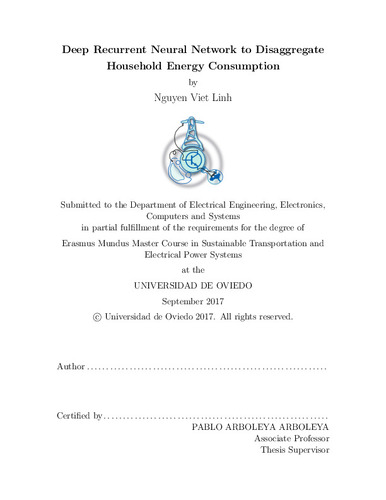Deep Recurrent Neural Network to Disaggregate Household Energy Consumption
Autor(es) y otros:
Director(es):
Palabra(s) clave:
Non-intrusive Load Monitoring
Energy Disaggregation
Recurrent Neural Network
Genetic Algorithm
Reference Energy Disaggregation Data Set
Fecha de publicación:
Serie:
Máster Universitario Erasmus Mundus en Transporte Sostenible y Sistemas Eléctricos de Potencia (EMMC STEPS)
Descripción física:
Resumen:
Non-intrusive Load Monitoring (NILM) is a technique which accepts the total consumption in a house as an input and computes the estimated demand of individual appliances in that house. All NILM needs is one single meter to record the total power of a house. With NILM, the users can assess the information of appliances without the intrusion of measurement devices. Such information could help users adapt their energy-usage habit for better saving and facilitate the grid management. This motivates our effort to research the NILM topic, which focuses on disaggregation algorithm in this thesis. The main goals of this thesis are to build a web interface for the energy usage feedback, to enhance the disaggregation algorithms as well as to investigate the non-intrusive technique in fault study. The first part of this work reviews the NILM background and states whether NILM is helpful to alleviate the climate change. The second part describes various sources of dataset and selects one for visualizing in the web interface. This is the first attempt to build an online energy feedback platform for the end-users. Our third effort is to advance the concept for disaggregation algorithm, which is the deep recurrent neural network (DRNN). %The experiments were tested in two scenarios: the first was to test the learning models in a house seen during training and the other was to test those models in a house not involved during training. The results showed the better performance achieved by DRNN, compared with the classic optimization. DRNN has also done a fair job to test unseen appliances. Finally, the application of non-intrusive technique to fault study has been initially studied. Our discussion has found the feasibility of non-intrusive fault detection with satisfactory outcomes.
Non-intrusive Load Monitoring (NILM) is a technique which accepts the total consumption in a house as an input and computes the estimated demand of individual appliances in that house. All NILM needs is one single meter to record the total power of a house. With NILM, the users can assess the information of appliances without the intrusion of measurement devices. Such information could help users adapt their energy-usage habit for better saving and facilitate the grid management. This motivates our effort to research the NILM topic, which focuses on disaggregation algorithm in this thesis. The main goals of this thesis are to build a web interface for the energy usage feedback, to enhance the disaggregation algorithms as well as to investigate the non-intrusive technique in fault study. The first part of this work reviews the NILM background and states whether NILM is helpful to alleviate the climate change. The second part describes various sources of dataset and selects one for visualizing in the web interface. This is the first attempt to build an online energy feedback platform for the end-users. Our third effort is to advance the concept for disaggregation algorithm, which is the deep recurrent neural network (DRNN). %The experiments were tested in two scenarios: the first was to test the learning models in a house seen during training and the other was to test those models in a house not involved during training. The results showed the better performance achieved by DRNN, compared with the classic optimization. DRNN has also done a fair job to test unseen appliances. Finally, the application of non-intrusive technique to fault study has been initially studied. Our discussion has found the feasibility of non-intrusive fault detection with satisfactory outcomes.
Patrocinado por:
This work was partially supported by the Spanish Ministry of Economy and Competitivity under Grant MINECO-17-ENE2016-77919-R (CONCIALIATOR Energy conversion technologies in resilient hybrid AC/DC distribution networks.
Colecciones
- Trabajos Fin de Máster [5296]
Ficheros en el ítem





